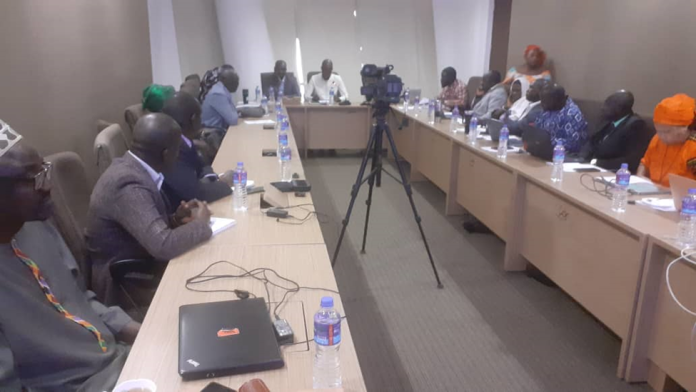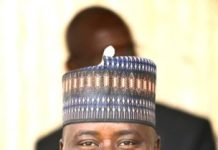By Momodou Jarju
Civil Society Organisations (CSOs) in The Gambia Wednesday faulted the proposed Women’s (Amendment) Bill and urged the National Assembly Members (NAMs) not to repeal the Women’s Act during a consultative meeting with the Joint Committee on Health and Gender on the aforesaid bill.
The officials from Child Protection Alliance (CPA), Think Young Women, Network Against Gender Based Violence (NGBV) and ActionAid the Gambia (a global justice federation), thronged the assembly’s Committee Room 2A to engage the above-mentioned joint committee. Two UNICEFs representatives and prominent activist Jaha Dukureh were present to observe the meeting.
The national coordinator of NGBV Mr. Fallu Sowe, who presented their institution’s position paper on the matter, said evidence from researches conducted in The Gambia and other parts of the world have shown that the practice violates women and girls’ sexual and reproductive health and rights, including right to choose and dignity.
As a human rights network, he said they promote and defend right to religious practice and their campaign to not lift the ban on FGM/C is not anti-Islamic, but rather based on the Islamic teaching of Do No Harm.
“Furthermore, from an Islamic point of view, Islam prioritises health. This is why Muslims who are not healthy enough to fast or to perform Hajj are exempted from these religious obligations based on professional medical doctor’s advice. Based on this Islamic Do NO Harm principle, the practice of FGM/C should be banned in The Gambia,” he said.
Sowe disclosed that in 2017, a clinical research on the ‘Obstetric Outcome of FGM’ on pregnant women in The Gambia was commissioned by NGBV and ActionAid International The Gambia in partnership with the Ministry of Health.
The study was conducted in four major health facilities: Edward Francis Small Teaching Hospital (EFSTH), Jammeh Foundation for Peace Hospital (JFPH), now called Bundung Maternal and Child Health Hospital, Brikama District Hospital, and Bansang General Hospital.
“The study was done by Gambian Doctors and Nurse Midwives working at the above-named hospitals. The on-site investigators were Dr. Neneh Bah and Dr. Awa Jah of EFSTH, Dr. Dado Jabbi of Jammeh Foundation for Peace Hospital now known as Bundung Maternal and Child Health Hospital, Dr. Lukas Jatta of Brikama District Hospital and Dr. Momodou T. Nyassi of Bansang Hospital. They were supported by sixteen senior Nurse Midwives who were working at the labour wards of these hospitals. These Gambian doctors and midwives were trained and guided by specialists including Dr. Patrick Idoko, a Gynecologist and Dr. Mustapha Bittaye, a Gynecologist and Research Clinician at EFSTH and Dr. Olubukola Idoko, a Paediatrician and Research Clinician at MRC amongst others,” he said.
Mr Sowe said a total of 1,569 women participated in the study. Below are some of the findings:
>23% had no FGM/C
>77% had FGM/C out of which:
1) 23.8% had undergone FGM/C type I
2) 44.8% had undergone FGM/C type II
3) 8.4% had undergone FGMIC type II/IV
>Only 6 cases of type IV FGM/C were recruited into the study.
> The age range of study participants were from 18 to 46 years.
>39.2% live in the rural areas while 60.8% lived in urban areas.
Mr Sowe said according to the report of this clinical study on FGM, women with FGM/C are more likely to have blood loss of 500ml or more after delivery and the risk increases with the severity of the type of FGM/C.
He further said the study revealed that women with FGM/C are more likely to have undergone operation during childbirth with the risk increasing based on the severity of the FGM/C type. It also found that women are not the primary decision makers on matters concerning their own sexual and reproductive rights.
“Women with FGM/C are more likely to have perineal laceration (tears) or episiotomy (a cut through the area between the vaginal opening and anus to aid childbirth) with the risk increasing based on the severity of the FGM/C type.
“Most women suffer in silence as they hesitate to express pain related to childbirth and to FGM/C, noting that open discussion of sexual and reproductive health is hindered by norms related to privacy and projecting strength,” he said, citing the study’s findings.
According to Sowe, NBGV and the larger CSOs in The Gambia position on FGM/C is for the ban to remain. And based on the evidence presented above and the ‘Do No Harm’ principle of the medical profession, he said FGM/C should not be medicalised. He urged the lawmakers to consider the health implication highlighted by professional health workers and reject the Women’s (Amendment) Bill 2024. This, he opined, will empower affected individuals and communities, strengthen the health rights and dignity of survivors and facilitate the eradication of the practice.
“Honourable NAMs, various justifications, both socially and religiously have been attached to the practice of FGM. However, the reasons given cannot be justified considering the evidence that has been presented to you which showed the practice violates women’s sexual and reproductive health and rights,” he said.
The NGBV coordinator said to address FGM/C problem in the country, the national assembly and the executive should ensure the Act is maintained. Also, he said both august establishments ought to amplify community engagement and raise awareness on the health consequences of FGM/C to empower communities to abandon the practice.
He added: “Strengthen police and other law enforcement agencies to maintain and implement the Women’s (Amendment) Act 2015 to deter communities from practicing FGM/C and protect women and girls from the harmful effects of FGM/C.
The executive director of ActionAid International TheGambia Mrs Ndella Fye Colley applauded the government, development partners and CSOs who did a lot in the past to improve gender equality which has been clearly spelt out in the new national development strategy (NDP 2023-2027).
“This national strategy was recently launched, as recent as this year, and it elaborates this critical priority area, so any attempt to repeal the law will be very surprising and will be a departure from our commitment to gender equality and women’s empowerment, and it also will go further to affect the country when it comes to indicators that are linked to measurements of human development in the world, and of course The Gambia is not an exception to these countries, let’s be mindful of that,” she explained.
She said their institution strongly opposes any proposal to repeal the ban on female genital mutilation or cutting, or even attempt to plan to medicalise it, based on all the reasons that have already been highlighted by other speakers. Madam Colley said it’s also based on their conviction that FGMC constitutes a severe violation of the fundamental human rights of girls and women, and lifting the ban would pose grave risks to their lives and well-being.
“In a country where three-quarters of the Gambian adolescent girls, we are talking about three-quarters because 70-plus figures have been mentioned, have already undergone it, even though the law is there. So you can imagine what will happen. Rather, we should be recognising the fact that there is an urgent need to intensify our efforts to eliminate the practice, instead of reversing and going back,” she said.
Colley said the consequences of legalising FGMC would endanger the lives, health and future of girls and women. This, she went on, will have a negative effect on women and girls’ empowerment as well as signaling significant setbacks in the fight against violence against women and girls in the country.
“So the repeal of the ban not only jeopardises the progress made in combating FGMC, but also sets a dangerous precedent to undermine national efforts to eradicate this form of violence,” she said.
“We are not anti-traditional practice, because we come from different cultures, but we also recognise that there are some cultures we find in place that are not positive, some of which we’ve dropped without query, without fight. So the same thing is what we’re asking to be considered on this practice, especially if we have really made them very clear in our recovery-focused National Development Plan, which is expected to be implemented from last year up to 2027.”
The national coordinator of CPA Mr. Lamin Fatty shared similar remarks while noting that his-led institution is totally against the repealing of the Women’s Act because the practice is harmful and contradicts national and international laws.
He said it’s unfortunate that they are invited by the national assembly to talk about regressive issues that are affecting women/girls rather than engaging the lawmakers on ways to advance women’s welfare or matters. For him, the FGM/C proponents’ argument that they support it for religious purification is weak as its authentication doesn’t exist in the Quran and Sunnah.
“The best decision you will make…., do not repeal it,” he told the joint committee.
A legal practitioner representing Think Young Women at the meeting Ndey Njoneh Jeng said their position remains that female circumcision is a harmful cultural practice that has no place in a progressive society. And despite its severe socio-economic implications, she said the practice remains a prevalent and deeply entrenched social practice in many parts of The Gambia which not only violates fundamental human rights but also perpetuates discriminatory attitudes and economic disparities that hinder social progress
Ms. Jange highlighted six socio-economic implications of FGM/C in the country. They include discrimination and social marginalisation, low socio-economic development indicators, child valuation and marriageability status, financial burden on families and communities, increased burden on the health system, and diminished quality of life and limited performance in the labour market.
A detail report of these implications would be published in this medium tomorrow, as well as the presentation of Dr. Babanding Daffeh’s presentation, revealing compelling evidence of FGM/C practice in the country.





















